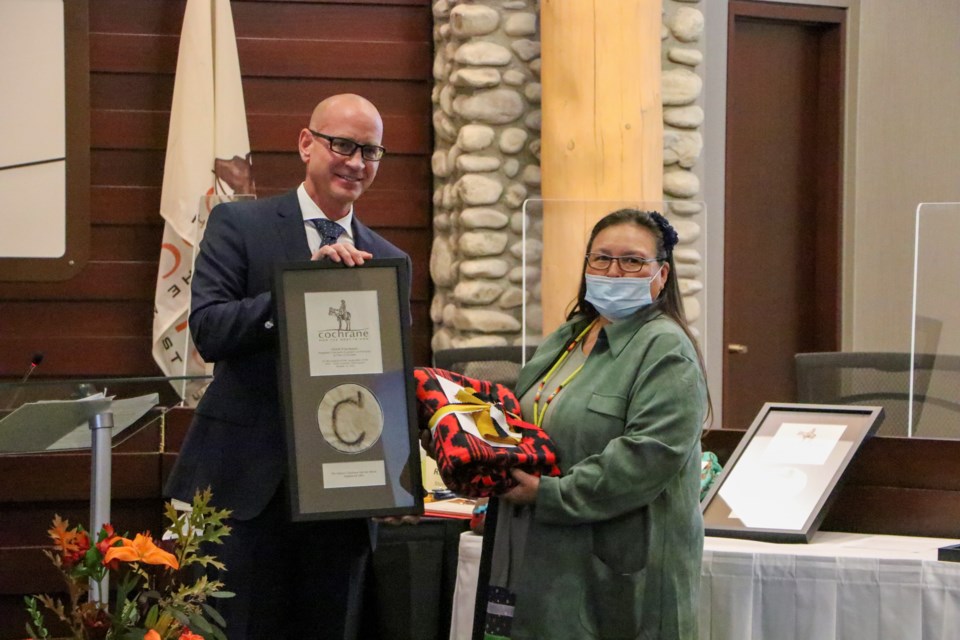The Federation of Canadian Municipalities (FCM) will soon announce eight new partnership selections for Phase 3 of the First Nations-Municipal Community Economic Development Initiative (CEDI), and Cochrane and Stoney Nakoda First Nation's application is on the shortlist.
A total of 68 communities across Canada applied for phase three of the program, which is a joint effort between FCM and Cando, a national Indigenous organization that promotes community economic development.
The CEDI program helps to build capacities to create sustainable partnerships and improve success of joint economic planning and initiatives among First Nations and municipalities through a hands-on approach.
While it has yet to be determined if Cochrane and Stoney Nakoda First Nation will be selected for the program, Mayor Jeff Genung said he remains hopeful it may come to fruition.
"We haven't officially heard if we've received the approval, but I find that to be good news if [CEDI representatives] are asking for more information," he said. "I think they're trying to reach out to two of the other First Nations that comprise Stoney Nakoda for that."
The mayor, Stoney Tribal Administration CEO Ryan Robb and chiefs from all three bands that make up Stoney Nakoda First Nation were invited to the virtual interview with CEDI representatives on Dec. 8.
Due to scheduling conflicts however, only the mayor, Robb and Bearspaw Chief Darcy Dixon were able to connect, in the absence of Wesley Chief Clifford Poucette and Chiniki Chief Aaron Young.
It is expected that program representatives will need to meet with Poucette and Young before making a decision to approve the application, as it's comprised of the three separately managed bands under Stoney Nakoda.
The program, which is funded by Indigenous Services Canada, would provide educational, financial and boots-on-the-ground resources as part of its goal to connect and start conversations between the two communities on various subjects such as labour, mobility, environment, tourism and economic development.
Mayor Genung said he believes one of the biggest, most fundamental areas of improvement needed between Cochrane and Stoney Nakoda First Nation is communication.
"Having regular interactions with Stoney Nakoda would be greatly beneficial to Cochrane, for sure," said Genung. "Then it may just be matter of unpeeling the layers of how it is that they would like us to navigate each other's systems to connect on anything."
Based on assessments from four out of 15 CEDI partnerships, a study by FCM and Cando found that the program has helped contribute to $10 million in private investment, $20 million in public investment, more than $10 million in fiscal benefits to First Nations governments and the creation of more than 650 jobs.
According to the study, the program, which originated in 2010, also contributes to improvements in regional investment readiness for things such as advancements to governance and capacity, better planning and communication, improved services and agreements and the formation of deeper relationships, among other things.
Similar to the existing inter-municipal committee that the Town of Cochrane and Rocky View County share as bordering neighbours, Genung said he would like to see a committee of sorts created with Stoney Nakoda First Nation, which also borders Cochrane.
"We have a terms of reference, we talk about issues, we talk about things of interest and initiatives that maybe we want to discuss — that type of thing," he said of Rocky View County council.
"But then, how do we set that up with Stoney Nakoda? Should I be meeting with Stoney Tribal Administration? Should we be meeting with the administration of each of the First Nations — Bearspaw, Chiniki and Wesley?"
These are some of the questions that still need to be discussed before those conversations can take place, he explained.
"[The town] has reached out and invited Stoney Nakoda to our inaugural [council] meeting, where we were sworn in and they sent proxies for the chiefs, and they've done the same," said Genung. "I've been to a couple swearing-in ceremonies on the Nation and it's great."
He said once all parties are in the same room, conversation flows naturally around different things happening within the Nation and in Cochrane, and the prospect of working together or meeting to discuss a topic further comes up, but far too often it never goes past a good intention, from both sides, he admitted.
"I don't think we're setting ourselves up for success by not having those organized collision times," said Genung.
While Truth and Reconciliation has been at the forefront of many conversations with Stoney Nakoda First Nation and other Indigenous, Métis and Inuit people across the country in the last year, Genung said this initiative is an added piece, separate — but not really, from the steps they're also trying to make there.
"If this initiative facilitates a meeting that's monthly, where we can talk and just break down barriers of how it is that we want or should communicate with one another, I think it would be a huge win," he said.



